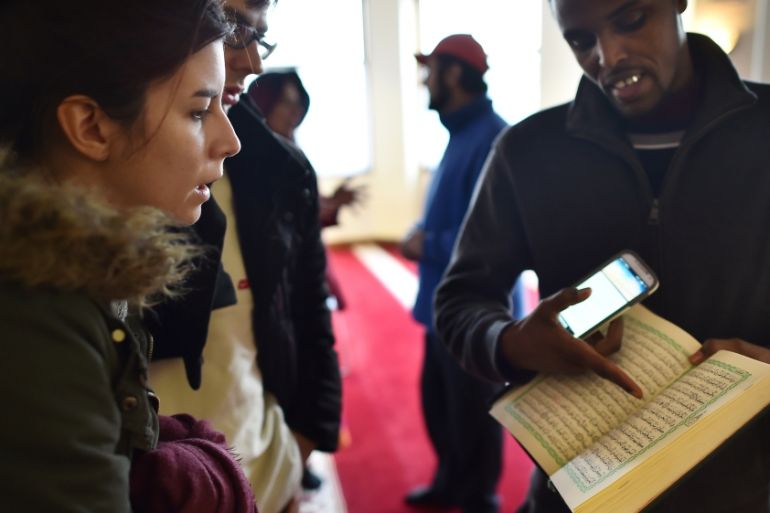Election should galvanise British Muslims
Greater Muslim political participation is the best way to turn challenges into opportunities.

The Counter-Terrorism and Security Bill that enjoyed widespread support in Britain received Royal Assent on February 12. But the Muslim community is worried about the implications. The stigmatisation of Muslims, especially after the Paris attacks in January, has reached such a high peak that the bill did not attract enough criticism from mainstream political figures and organisations to significantly water down its discriminatory nature.
Among only a handful of groups that showed concerns against the bill and campaigned to stop it were Muslim students, joined by many university societies across the country, for fear that the bill would restrict and invade the lives of students.
Keep reading
list of 4 itemsPalestinian Prisoner’s Day: How many are still in Israeli detention?
‘Mama we’re dying’: Only able to hear her kids in Gaza in their final days
Europe pledges to boost aid to Sudan on unwelcome war anniversary
Under the bill, the government will have the power to place a statutory duty on “universities, schools, NHS Trusts and even nurseries to implement measures to prevent radicalism”; this, according to the Federation of Students Islamic Societies will “disproportionately target Muslim students, leading to further stigmatisation and alienation”.
Grave concerns
Now that the bill has become law, what should citizens who have grave concerns do about it?
One way, of course, is for conscious citizens to watch how the law will be applied in real life and challenge any potential misuse through a robust judicial process.
However, the most powerful antidote to an ill-thought-out law in any democratic society is to get rid of a siege mentality, create awareness among citizens and challenge it politically.
|
|
Muslims in Britain are going through unprecedented media and political challenges in recent years. While no civilised society punishes the people for the crimes of a few individuals from within, Muslims have become an exception; they are not only expected to answer for the criminality of their co-religionists but are also being thrown in the dock by our media and political establishments.
Contrary to common-sense wisdom and the established norm, Muslims feel they are presumed “guilty until proven innocent”.
The presence and influence of Muslims in the media and politics is weak; some have arrived from countries where political participation is a luxury, if not a crime.
But the British political environment is different and Muslims must not succumb to the easiest option of sitting idle and shouting from the periphery. They, like other groups, have a stake in the affairs of the country.
Politics do matter
Politics does matter for all citizens – and for Muslims, it matters more now. Unless they get involved in the political process, they will always remain underdogs. They should, however, practise smart politics and pick and choose from established political forces in the country. They should avoid putting all their eggs in one basket; block voting for one party can worsen their situation.
The 2015 general election on May 7 is crucial for them and other disadvantaged groups to rise up, organise themselves, forge alliances with right-minded people and influence the outcome. In a democratic society, a group of people, however weak they may appear to be, have a huge leverage in affecting the electoral outcome if they hold their nerve and use their votes strategically – as part of their civic responsibility.
In a democratic society, a group of people, however weak they may appear to be, have a huge leverage in affecting the electoral outcome if they hold their nerve and use their votes strategically - as part of their civic responsibility.
Registering to vote on time is the first step. A country-wide voter registration campaign that started on February 5 is going to end on April 20; only those who register can vote on May 7.
Politics is about serving people and country. However, getting involved in party politics may not be many people’s choice. Using other political tools such as lobbying or using pressure tactics to influence policy-making for or against any government decision, etc, are part of the vibrancy of a democratic society.
Scottish referendum
The Scottish referendum last year that generated an extraordinary vibe, not only in Scotland but across the country, proved that people do care about politics and political outcomes.
To have maximum impact on the political outcome, Muslim communities need a new breed of dynamic and spirited community-anchored young political talents who can turn their current challenges into opportunities.
First generation Muslims have rightly built the basic infrastructure – mosques, community centres, schools, small businesses, etc. They are the community’s bricks and mortar – the precious hardware. It is time this infrastructure was used properly and run effectively with businesslike professionalism and excellence – not only for the benefit of Muslims but for all British society. What is needed is effective human software.
The Muslim Council of Britain’s recent launch of “British Muslims in Numbers” gives a mixed picture of their challenges and opportunities. While they comprise less than one in 20 of the overall British population, with a higher youth population and entrepreneurial skills they are a strategic asset for Britain.
More educated than a decade ago, the community has a lot to offer to Britain’s future.
Dr Muhammad Abdul Bari is an educationalist, author, parenting consultant and commentator on sociopolitical issues.
The views expressed in this article are the author’s own and do not necessarily reflect Al Jazeera’s editorial policy.
